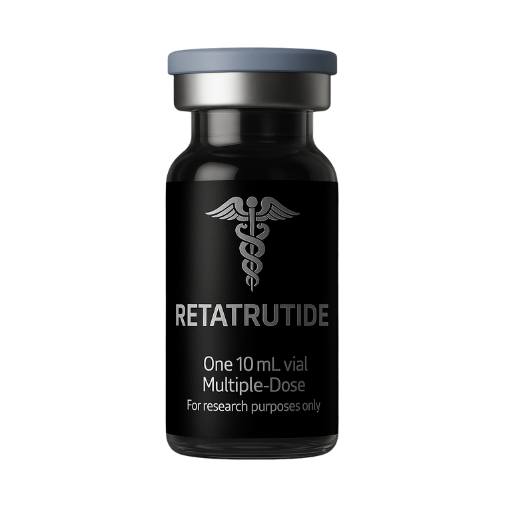Retatrutide (LY3437943) is an investigational, single-molecule triple agonist of the GIP, GLP-1, and glucagon receptors under evaluation in metabolic-disease research. Preclinical and early clinical literature explores effects on energy balance, body-weight regulation, glucose homeostasis, and liver/adipose biology in controlled study models.
Incretin Pathways (GIPR/GLP-1R): Co-agonism is studied for potentiating glucose-dependent insulin
secretion, attenuating inappropriate glucagon during hyperglycemia, delaying gastric emptying, and enhancing central
satiety signaling in hypothalamic circuits.
Glucagon Receptor (GCGR): Tuned activation is investigated for increasing energy expenditure,
promoting lipid mobilization/oxidation, and modulating hepatic lipid handling; balance of GCGR with incretin tone is
a key variable in dose-finding paradigms.
Downstream Readouts: Experimental endpoints commonly include changes in post-prandial glucose/insulin,
gut-hormone profiles, resting energy expenditure, liver fat fraction, adiposity indices, and appetite-related
neuropeptide signatures.
Energy-balance and weight-regulation models • Glucose-tolerance and mixed-meal tests • Body-composition and indirect-calorimetry studies • Hepatic steatosis/NASH frameworks • Lipid-metabolism and adipocyte signaling assays • Appetite/food-intake behavior paradigms • Pharmacokinetic/pharmacodynamic (PK/PD) modeling of multi-receptor agonism.
Revitalized Health research peptides are produced under cGMP-aligned conditions with pharmaceutical-grade inputs. Each Retatrutide lot is confirmed at ≥99% purity by HPLC with identity verified via LC-MS/MS. Lots undergo appearance/solubility checks and microbial/endotoxin screening to research-grade specifications. Batch-specific Certificates of Analysis provide full methods and results for traceability.
Store lyophilized vials at 2–8 °C, protected from light and moisture. After reconstitution with bacteriostatic water, maintain at 2–8 °C and utilize within 20 days. Avoid repeated freeze–thaw cycles to preserve peptide integrity and receptor-engagement fidelity in experimental use.
For laboratory research use only. Not intended for human consumption, therapeutic, or diagnostic application. Supplied exclusively to qualified professionals conducting controlled scientific investigations.
Formulated for research applications. Purity, identity, and lot analytics available per batch. Not medical advice.
Identity: Retatrutide (LY3437943), a single-molecule peptide co-agonist at GIP, GLP-1, and glucagon receptors.
Mode: Incretin agonism supports glucose-dependent insulin secretion, reduced inappropriate glucagon during hyperglycemia, delayed gastric emptying, and central satiety signaling; calibrated GCGR activity is investigated for ↑ energy expenditure and lipid mobilization with hepatic fat handling effects.
Analytics: Purity by HPLC; identity by LC-MS/MS; sequence confirmation; endotoxin via LAL. PD readouts: mixed-meal/glucose-tolerance testing, indirect calorimetry, body-composition measures, MRI-PDFF for liver fat, appetite/food-intake paradigms, receptor cAMP/β-arrestin assays. Monitoring (research): GI tolerability, heart rate, glucose/insulin panels, hepatic enzymes, lipids.
For educational/research-style product content. Not medical advice; not for human use.

